A Conversation With Rashaad Ernesto Green (GUN HILL ROAD)
Rashaad Ernesto Green began his career as an actor before stepping behind the camera to write and direct several award-winning short films. With his feature debut, Green proves those shorts were no fluke. Gun Hill Road, which world premiered at the 2011 Sundance Film Festival, uses a familiar narrative framework to tell an anything-but-familiar tale. Enrique (Esai Morales) has just been released from prison, but when he returns to his Bronx apartment to reunite with his wife Angela (Judy Reyes) and son Michael (Harmony Santana), he discovers that Michael is in the process of transforming into a female named Vanessa. For someone who was raised in a macho Latino culture and is still haunted by his experience on the inside, this revelation comes as an affront to his entire belief system. Green’s fusion of a more traditional storytelling style with such raw subject matter is what distinguishes Gun Hill Road. It’s a well-executed, thought-provoking independent drama that, in a better world, would break out of the indie bubble and connect with a much wider audience. Just days before the film was reaching theaters in New York City on Friday, August 5, 2011 (thanks to distributor Motion Film Group), I met up with Green in Union Square to discuss his impressive achievement.
Hammer To Nail: Here’s a silly, but honest, question: Have Oprah and Tyler Perry seen this movie?
Rashaad Ernesto Green: I don’t believe so. Not yet. [laughs]
H2N: I realize it’s reductive to make the comparison, but the business aspect of filmmaking is reductive, so did the success of Precious impact your ability to get this film made? Or were the wheels already in motion and that had nothing to do with it?
REG: I guess in the promotion of this, it’s maybe been a little bit more effective to refer to Precious as the type of success this may have if it reaches the right audience with the right money behind it. But as far as actually getting it made, I had a script that was already written. My producer [Ron Simons] approached me, having done Night Catches Us the previous year at Sundance, and asked me what I had next. My shorts had done pretty well on the festival circuit, and I guess he was interested in whether I had a feature or not. And I did. And he liked it. That was pretty much how this one got made.
H2N: This is a world that you come from, as far as the Bronx goes. But what about the story itself? Did you invent it as a way to explore broader themes you’d encountered growing up, or do you have a more personal connection to the material?
REG: Both the environment and the story itself are things that were personal to me. I was born in the Bronx, my family’s from the Bronx, and the story’s inspired by someone in my family. The Bronx that I’ve seen in films so far, up until this date, we don’t often get to see the Bronx I’m familiar with, which is full of family, love, culture. We often see the stereotypes. And I guess I wanted to see a deeper side, and a more complex side of the borough I’m familiar with.
H2N: The term “research” could allude to a ton of different things, but with regards to Michael/Vanessa, did your preparation consist of covering lots of angles and really digging into different aspects, or were you relying on your imagination to guide you?
REG: There were definitely aspects of this story that I had no idea about going in. I knew that I had to supplement myself with tons of research, so I spent months on Christopher St. hanging out with transgender females and talking to bartenders down at Chi Chiz, just really hanging out. Down at the piers, at dance workshops, just talking to folks, teachers who’ve had students at HMI (Hetrick-Martin Institute) just talking to all kinds of people—kids, teenagers, LGBT organizations. I did not know much. But in order to put it on screen, I really felt like I needed to be an expert in order to represent it properly. Hopefully I did that by showing the human aspect of this character. I didn’t want to necessarily put my research on the screen. I wanted my research to support the character that I drew.
H2N: And on the other side of that, you’re telling parallel stories here, so did you take the same approach with regards to the father character?
REG: Absolutely. I definitely did that. That side of the research came from someone who went through that very experience. The first rendition of the script was heavily told through that character’s perspective. I felt pretty confident on that side of things, until the character of Michael/Vanessa started to speak more loudly and take over a bit. It really shifted the balance to a dual-protagonist story, because of that. I realized this is the part of the story people are gonna find most interesting because it’s a world they don’t know much about. I wanted to make sure that I really understood that aspect of it. But of course, the first rendition was heavily through the father’s perspective. Hopefully, at the end of the day, we feel for both characters.
H2N: Casting is always everything, but in this case, it’s indescribably important. How long did it take for you to find this really striking performer, Harmony Santana?
REG: It took a couple of months. I guess two or three months scavenging the streets of New York.
H2N: Were you not necessarily concerned with the person having acting experience? Like, finding the right type of person was most important, at which point you’d trust that you could draw the performance out of them?
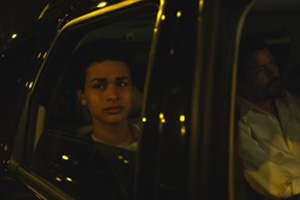 REG: I guess I knew pretty early on that I probably was not going to find an actor for the role. I was happy with someone who had any acting experience, or someone who may have performed poetry, for example. Any aspect of performance, I would have been very happy with. But those people I knew I probably would never find through the traditional forms of casting, which is self-submission, the online casting services, our casting director of course with actors and agents and so forth, I was not gonna find that person through those means. So I had to be the one to reach out to those who did not know about film. And it was tough. I was run ragged before production even began, because I was out until 3/4 in the morning at the 18-and-over nightclubs, I was in dance workshops, at LGBT organizations, and at the pier and on Christopher St., and on Facebook, Facebooking every person! Just trying to find people who might be interested. We went everywhere. We were in the Bronx… [laughs]… in remote clubs, on certain nights that catered to a certain audience. It was a long haul. But we lucked out.
REG: I guess I knew pretty early on that I probably was not going to find an actor for the role. I was happy with someone who had any acting experience, or someone who may have performed poetry, for example. Any aspect of performance, I would have been very happy with. But those people I knew I probably would never find through the traditional forms of casting, which is self-submission, the online casting services, our casting director of course with actors and agents and so forth, I was not gonna find that person through those means. So I had to be the one to reach out to those who did not know about film. And it was tough. I was run ragged before production even began, because I was out until 3/4 in the morning at the 18-and-over nightclubs, I was in dance workshops, at LGBT organizations, and at the pier and on Christopher St., and on Facebook, Facebooking every person! Just trying to find people who might be interested. We went everywhere. We were in the Bronx… [laughs]… in remote clubs, on certain nights that catered to a certain audience. It was a long haul. But we lucked out.
H2N: And how soon is this before shooting? Like, were the dates set and this movie was going to be shot during that period no matter what, or were you waiting until you found the right person?
REG: No, the dates were set. Esai and Judy were cast.
H2N: Boom. [laughs]
REG: Yeah, it was full steam ahead. I had a date, and my producers were on my back. Like, “Rashaad, you need to find someone this week.” And I said, “Well, what if I don’t? I’ll have to find them next week!” I was literally pulling my hair out. I haven’t told anybody this story. I’ve told a lot of people how I found Harmony, but when she showed up to that first audition, I was at a point where we could not search any longer. I could not take another few days. It was at the witching hour, and I was stressed beyond belief.
H2N: Oh man.
REG: There was a girl that I had met that I was very excited about before Harmony. She had come into one audition and I asked her back, and this was her callback day. She didn’t show up. And I was just devastated. And Harmony was sitting there with the sides. I had already of course met her and thought she might be a good fit, but she was sitting there with the sides, and I was losing my mind. I told my assistant, “Make her the one. Make her the one.” And I had to literally leave the building—we were holding auditions at NYU—and I walked around the block to just clear my head, pray to God, whatever it was, I was just like, “God, please send me someone now.” [both laugh] And I came back after that walk and saw Harmony’s audition. And I felt okay. It wasn’t like, “Yes!” It was, “Okay. I’ve got enough here, she has enough ability to be natural, that I can work with it. I can work with this. Come back again, please. Show me that you’re dedicated, show me that you’re on time, and also dressed as a girl.” And she did, and she was beautiful and I was like, “Okay, this is it, this is it.”
H2N: And how long was that before day one? Are we talking weeks?
REG: I wanna say four? I originally found her at some point in June, must’ve been mid-June, and we started production end of July. So, four to five weeks, which was crunch time! We needed the casting director to approve it, the producers to approve it, everybody had to be a-okay. You know, Harmony was 5’11”, and Esai and Judy were…
H2N: Not?
REG: Not! [laughs] And I was like, “I’ll shoot around that. We’ll make it work.” Then we put her through a process, an acting workshop of sorts.
H2N: And were you able at that point to focus solely on that?
REG: I had a friend who was in graduate NYU acting—she had worked with teenagers before—to help open Harmony up. And I would come in and see the progress and work with Harmony on the weekends, you know, rehearse the scenes they had gone over. I was scared. Going into production, I hadn’t seen everything that I needed to see. It was a process of breaking down that shell, just cracking little by little by little. And there were baby steps. But for the most part, I was very intimidated by what the future held in store. Because I knew that it would take time.
H2N: Well, there’s a really comfortable, lived in feel to all of the performances. As a director, I appreciate how much control you appear to have exerted over the situation, especially in that it doesn’t call attention to itself in the film itself. Like, it feels like the script was work-shopped and rehearsed, but not in a self-conscious way.
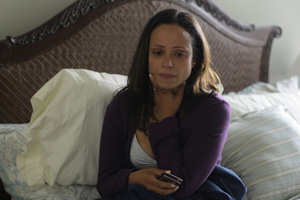 REG: I was an actor first, I come from the theater. Rehearsal is absolutely paramount to any theater production. But for some reason, in independent film, they forego the rehearsal process—because of money and time. That’s just something that I was not willing to do. I said, “I don’t care if I have to give up a couple days of the shoot, I need rehearsal with my actors.” Judy was gracious enough to come in two weeks beforehand to work with Harmony, which was great, because it gave us some time to establish the mother-and-child relationship before the father comes back. And then Esai came in a week ahead of time. So it doesn’t seem substantial, but for a three-week shoot, that two weeks…
REG: I was an actor first, I come from the theater. Rehearsal is absolutely paramount to any theater production. But for some reason, in independent film, they forego the rehearsal process—because of money and time. That’s just something that I was not willing to do. I said, “I don’t care if I have to give up a couple days of the shoot, I need rehearsal with my actors.” Judy was gracious enough to come in two weeks beforehand to work with Harmony, which was great, because it gave us some time to establish the mother-and-child relationship before the father comes back. And then Esai came in a week ahead of time. So it doesn’t seem substantial, but for a three-week shoot, that two weeks…
H2N: Even one long day…
REG: Even one long day. We went over all the family scenes, all the intimate moments that they had together. I gave them a chance to build their back-story together. I said, “Instead of me telling you what it is, it is your duty now to create that together, about what your relationship was when Enrique was not home, what it was like before.” So they’re living in embodied characters when we press go. And it’s characters that they helped to create. I wanted them to feel like they had lived in this house, and I didn’t want you to feel like you were watching a movie. I wanted you to feel like you were getting a secret glimpse into this family. It’s a way I like to approach it, and I think it worked well for this piece.
H2N: Obviously the family and those characters are the most prominent roles in the film, but the mind-blower to me was the character of the ‘bedroom boyfriend.’ What was that character’s name?
REG: The character’s name is Chris, played by Tyrone Brown.
H2N: I feel like that might actually have been the most difficult casting of all, in that for those scenes to feel sufficiently electrifying, you had to find someone who had the genuine energy and authenticity of a tough guy who normally wouldn’t play that. Where in the did you find him? He’s incredible.
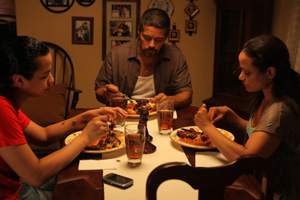 REG: He came through the traditional casting process. He came through an agent, through the casting director, into an audition. And he was good. He came up with a whole bunch of excuses on the day of, you know, why he didn’t have everything memorized, and I was like, “Stop, just stop. You’re good!” [laughs] “Now my question for you is, if you were to be given this role, you will be filming intimate scenes with…” and he just stopped me cold. “I’m an actor. I’m an actor.” “Would you be okay with kissing someone who’s not biologically female?” And he was like, “I’m an actor, if that’s what it calls for, of course. I’ll be fine.” And his confidence was very attractive to me. There were a few actors that came in and wanted to stretch themselves in that way as an actor. On the other side of the coin, folks that I had worked with in the past that I had reached out to, when I described the role, they said, “Hell no,” and ran in the other direction. There are definitely some brave performers out there who are willing to stretch themselves for a role, for a story they feel is important and needs to be told. He was one of them.
REG: He came through the traditional casting process. He came through an agent, through the casting director, into an audition. And he was good. He came up with a whole bunch of excuses on the day of, you know, why he didn’t have everything memorized, and I was like, “Stop, just stop. You’re good!” [laughs] “Now my question for you is, if you were to be given this role, you will be filming intimate scenes with…” and he just stopped me cold. “I’m an actor. I’m an actor.” “Would you be okay with kissing someone who’s not biologically female?” And he was like, “I’m an actor, if that’s what it calls for, of course. I’ll be fine.” And his confidence was very attractive to me. There were a few actors that came in and wanted to stretch themselves in that way as an actor. On the other side of the coin, folks that I had worked with in the past that I had reached out to, when I described the role, they said, “Hell no,” and ran in the other direction. There are definitely some brave performers out there who are willing to stretch themselves for a role, for a story they feel is important and needs to be told. He was one of them.
Of course, during the rehearsal process, however, there was a bit of discomfort, let’s say, that arose. I noticed it. We spoke about it. I had to be very honest with him. I said, “I hired you because of your confidence in this and we can’t afford to go back on that at this point. If you need to not be a part of this, please tell me now.” But he stuck it through.
H2N: Did you close the set for those scenes and really try to protect them as much as possible?
REG: Absolutely. Tyrone was a great team player. Understandably, there were times in rehearsal that some discomfort arose, but once we had the conversation and I made the rehearsal process safer to play. We didn’t go all the way, they didn’t have to come to close with their bodies—we simulated for the most part. But when it came time for the actual day of the shoot, all discomfort had to go out of the window, and it was time. To make the performance more comfortable, only the hands that were absolutely needed on set were allowed. Only I was at the monitor. But of course, you know, what’s shown in the film, what you think you’re seeing, it’s a little bit of movie magic. I don’t actually show any nudity in the film, but your imagination takes off, because of how courageous both performers were.
H2N: And even the camerawork, it just feels like you’re in there with them. All of it, the editing, technically there’s nothing that makes it R-rated, but, man, it feels so uncomfortably sexual and intimate!
REG: I never wanted that scene to be graphic.
H2N: Well that’s because it would then become about that and that’s not the point.
REG: I always wanted to be inside the mind of Vanessa’s experience. I wanted to see exactly what she was going through and feel for her in this moment, that this is a teenage girl who’s losing her virginity, and experience what that is for her—both painful and pleasurable at the same time.
H2N: I just reread Mike Ryan’s review for us, which we posted at Sundance. In some ways—especially as a filmmaker—you can read that as a backhanded compliment. He’s acknowledging that there’s some familiarity to the story and the narrative, but ultimately he comes out in full support of the movie, because the direction is so strong. When I finally saw it a few weeks ago, I understood what he was talking about. There is a tug between conventional storytelling and bracingly original content, but to me, that’s what makes it so special. It’s as if that familiarity in storytelling softens the blow of the rawness of the material itself, if that makes any sense. It actually makes your film more accessible for ALL audiences. Can you speak about that?
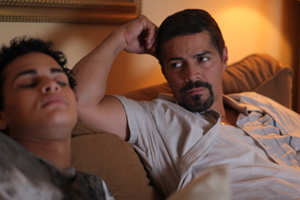 REG: For me, independent film sometimes gets a bad name, because we feel like it should be for a certain type of audience, and just always follow a different narrative structure. But people—regular movie-going audiences—respond to a certain structure sometimes. And I’m trying to reach not only an art house audience that will appreciate the film, but a mainstream audience who would never go to see this film.
REG: For me, independent film sometimes gets a bad name, because we feel like it should be for a certain type of audience, and just always follow a different narrative structure. But people—regular movie-going audiences—respond to a certain structure sometimes. And I’m trying to reach not only an art house audience that will appreciate the film, but a mainstream audience who would never go to see this film.
H2N: Speaking of audience, you’re on the precipice of a really interesting theatrical release. In addition to the Angelika, you’re also screening in Times Square at the AMC Empire where the regular folks tend to go! [REG laughs] So far, you’ve been playing the festival game, from Sundance to Latino fests to LGBT fests. But have you had any “real audience” test runs yet? Or is this weekend going to be the first time it will be in front of that type of crowd?
REG: This weekend will be a test, of course, but we have had screenings here in New York, to New York audiences, who have eaten it up. The New York crowd can really relate to this story, because they see characters that they see every day in the streets of New York. Latino people who have seen it, it’s hit them on an even deeper level, because they understand the culture and the family. If I go based on comments off YouTube, of course we’re gonna get plenty of people who don’t wanna see this. But I think that’s the point. [H2N laughs] That’s the point of filmmaking, that’s the point of art. To open minds and hearts. Hopefully I do it in a way that isn’t preachy. I put it through the perspective of a person who feels exactly the way they do. I hope the ladies who drag their boyfriends along with them to see it will understand, that the men can ask, “What if it were me? How would I react?” The movie challenges you to put love first. Love before your own hang-ups about what you feel is right or wrong about your children.
— Michael Tully







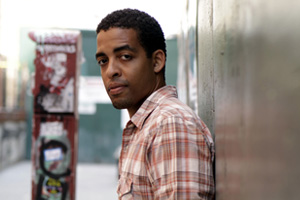
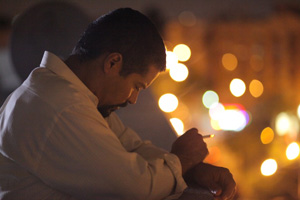
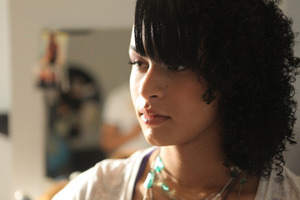





Pingback: HOME VIDEO PICKS – Hammer to Nail